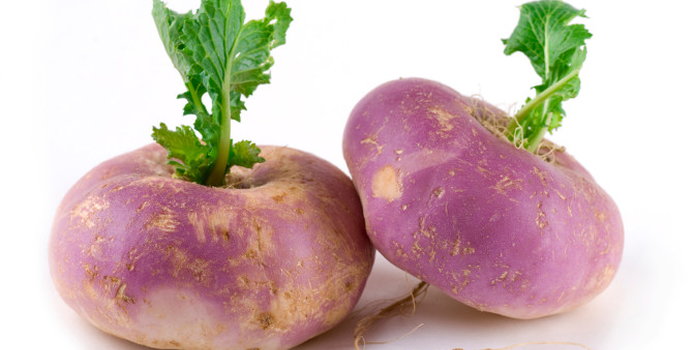The turnip is a highly nutritious starchy, root vegetable. It belongs to the cruciferous family. It is one of the world's ancient vegetables having been cultivated for more than 4,000 years. The roots resemble onion bulbs. They typically are whitish-yellow in color. Parts that poke through the top soil and get exposed to the sun develop a fusion of purple-green colors. The root has white flesh with a mild flavor. The leaves resemble spinach leaves and are supported by red stems. The leaves are also eaten due to their rich nutritional value. The vegetable is a good source of carbohydrates, fiber, vitamin C, calcium, phosphorous, potassium and magnesium. You can eat the vegetable raw or cook it briefly. It has several health benefits.
Cataracts
The leaves of the vegetable are a rich source of vitamin A and vitamin B1. These vitamins have been found to be beneficial in the prevention of cataracts. These are cloudy areas that develop on the lens of the eye. They arise from changes in the lens protein. Cataracts impair the vision.
Antioxidants
The vegetable contains high amounts of vitamin C, a natural antioxidant. One cup of the cooked root and leaves provides about 30 micrograms of vitamin C. This nutrient helps to prevent afflictions such as colds, ear infections and sore throats. Vitamin C helps to relieve inflammatory condition such as asthma. It also boosts the body's immune system. Turnips are a rich source of beta carotene which the body converts into vitamin A. This is one of the natural antioxidants that helps the body to maintain good health. The vegetable also contains flavonoids which have potent antioxidant properties. They help to neutralize free radicals in the body. This reduces the risk of various cancers.
Anti-Cancer
Research has established that certain phytonutrients in the vegetable have anti-cancer properties. The root and leaves of the vegetable are rich in vitamins A, C and E. These have been established as potent natural antioxidants. Regular intake of these vitamins have proven beneficial in the treatment of colon cancer. These antioxidants also lower the risk of colon, stomach and lung cancers.
Healthy Growth and Development
The various vitamins and minerals in a turnip supports overall good health. It is a good source of vitamins A, B-complex, C, E, K and folic acid. It also contains calcium, iron, phosphorous, potassium, magnesium and selenium. Adequate intake of these nutrients supports overall healthy development of the body. Vitamin A supports healthy skin and vision. It also helps to maintain healthy cell and mucous membranes. B vitamins are vital for various metabolic functions in the body. They also support brain development and functions. Vitamins C and E have antioxidant properties and enhance the body's immunity. These vitamins also promote colon health. Vitamin K supports healthy blood clotting and healthy bones. Folic acid supports healthy development of cells.
Turnips and Oxalates
Although very nutritious, turnips are amongst the foods that contain oxalates. These substances occur naturally in plants, animals and within the body. High amounts of these substances crystallize in the body and may create health problems. It is best to limit consumption of turnips if you have kidney or gall bladder problems. This is because oxalates can lead to the development of kidney stones.



